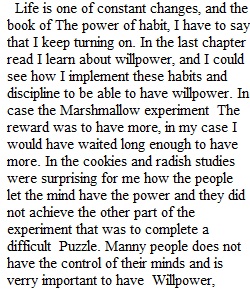


Q Overview After studying the following, complete this activity. Please use a document to type your answers to the questions. You do not have to rewrite the questions. Please name your file Lastname_TitleofActivity. Your complete activity should be anywhere between 250-500 words. Please write your work in MLA format. • The Power of Habit (eBook), Chapter 5 (pgs. 127-153) o Note: this resource requires library login. To access the library, right-click on the library link in our class to open it in a new tab, then select "Launch Library Sources." You can then return to this page and read the book. • Developing Essay 2: Narrative Writing Techniques Relevant Course Outcomes • Apply active reading strategies to a text selection Objectives • Identify the main idea of a passage. • Connect supporting details to the main idea of a passage. • Preview a text and ask clarifying questions. Assignment Guidelines Part One: Actively Reading Chapter 5 of The Power of Habit. Your answers should be 3+ or so sentences each. 1. Describe the “marshmallow study” that was conducted in the 1960s and the results of this study. What does this experiment tell us about the concept of self-regulation? Why is willpower a keystone habit? Describe the “radish and cookie experiment” conducted three decades later. How did the findings of the “radish and cookie experiment” add to what researchers already knew from the “marshmallow study”? How does this change your understanding of self-regulation, and willpower as a keystone habit? 2. Describe how the LATTE method (page 145) works and how it helps strengthen willpower? Part Two: Actively Reading Developing Essay 2: Narrative Writing Techniques. Your answers should be 3+ or so sentences each. Now, answer the following questions after studying the narrative writing lesson: 1. According to the materials you studied, why are stories such an essential part of how we communicate? What makes for a good story? 2. From the materials you studied, identify and describe what you believe are the two most important elements of a narrative essay. 3. What does RENNS stand for? How can you use RENNS to help you write a stronger story in part one of essay 2 (the paragraph where you will tell the story of the challenge you overcame)? Submitting Your Work • Upload your paragraph as a Word document. • Be sure to proofread your paper for sentence structure, clarity, typos, etc. • Be sure your work is formatted according to MLA standards. For help formatting your paper, please visit the MLA Format refresher in the Academic Refresher course or the Student Survival Guide. Late Policy: • All activities (except for discussions and Power Ups) may be submitted late at a deduction of 5 participation points per activity for one week after the closing date. After one week, the activity will be marked as a zero and can't be submitted late. Rubric Reader Response 1 (1) (1) Reader Response 1 (1) (1) Criteria Ratings Pts This criterion is linked to a Learning OutcomeActive Reading Vocabulary words are clearly defined, and a page number for the word is provided. For short answer responses student refers to specifics from the text in developing his or her answer, clearly illustrating active reading of the assigned readings. 7 to >5.5 pts Exemplary Vocabulary words are clearly defined, and a page number for the word is provided. For short answer responses student refers to specifics from the text in developing his or her answer, clearly illustrating active reading of the assigned readings. 5.5 to >4.0 pts Competent Vocabulary words are defined, and a page number for the word is provided. For short answer responses student refers to general from the text in developing his or her answer. 4 to >0 pts Needs improvement Vocabulary words are not defined, and/or a page number for the word is not provided. For short answer responses, student response is surface level or illustrates that the text was only skimmed rather than read using active readings strategies. 7 pts This criterion is linked to a Learning OutcomeCritical Thinking and Development of Ideas Ideas are developed with careful thought of how the assigned reading ties in with the skills the student is learning for a given week. Responses are worthy of further discussion and illustrate that the student is thinking beyond the literal level, and questions, challenges, and adds to the content and ideas in the text. 7 to >5.5 pts Exemplary Ideas are developed with careful thought of how the assigned reading ties in with the skills the student is learning for a given week. Responses are worthy of further discussion and illustrate that the student is thinking beyond the literal level, and questions, challenges, and adds to the content and ideas in the text. 5.5 to >4.0 pts Competent Ideas are developed with some thought of how the assigned reading ties in with the skills the student is learning for a given week. Responses are worthy of further exploration or discussion, 4 to >0 pts Needs Improvement Ideas are not developed with careful thought of how the assigned reading ties in with the skills the student is learning for a given week. Responses are literal and surface-level. 7 pts This criterion is linked to a Learning OutcomeMLA Formatted in MLA 3 to >2.0 pts Exemplary No more than one error in MLA format 2 to >0 pts Needs Improvement Multiple errors in MLA Format 3 pts This criterion is linked to a Learning OutcomeGrammar Proper grammar and mechanics observed. 3 to >2.0 pts Exemplary Proper grammar and mechanics observed. 2 to >0 pts Needs Improvement Grammar and mechanical errors interfere with reading and comprehension of ideas. 3 pts Total Points: 20 PreviousNext
View Related Questions